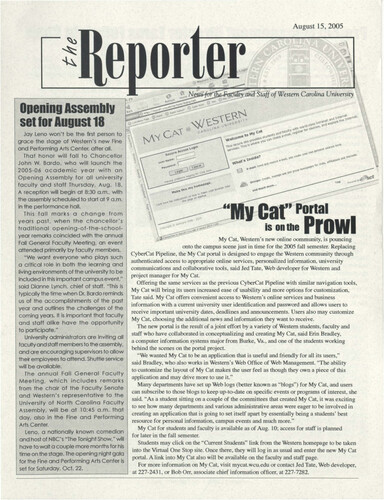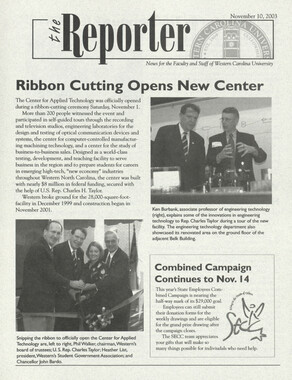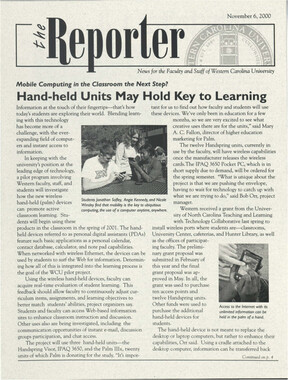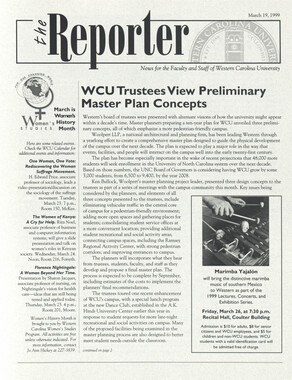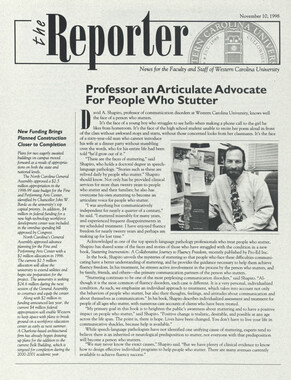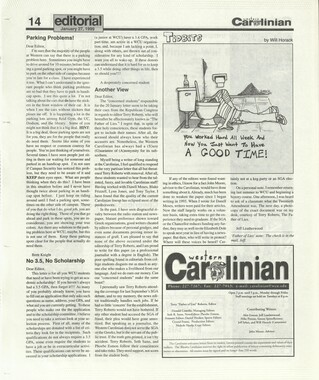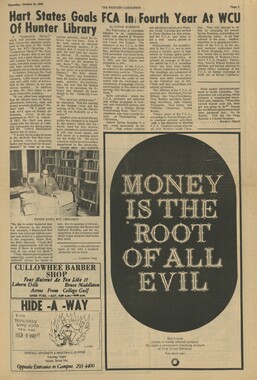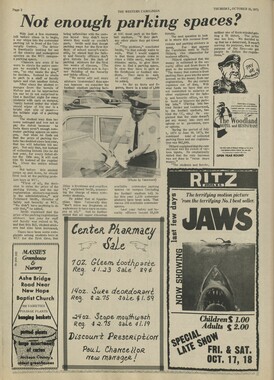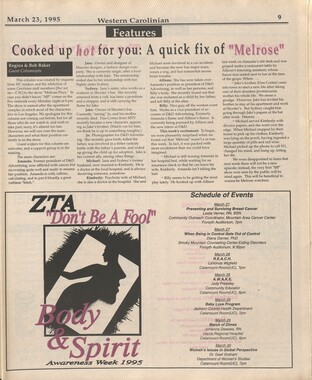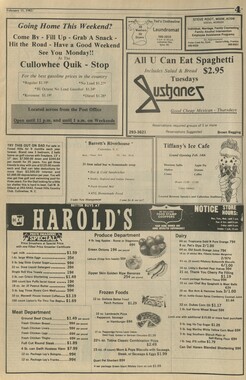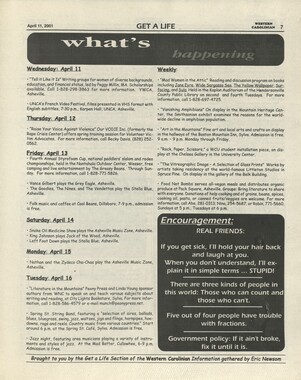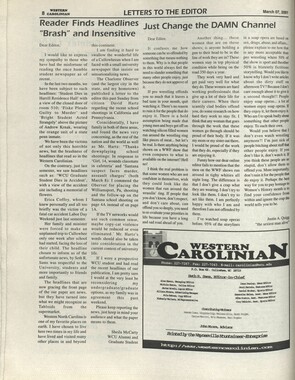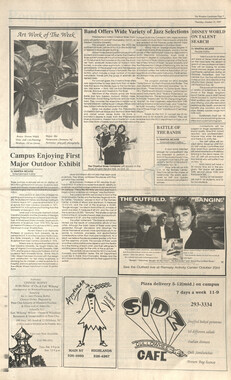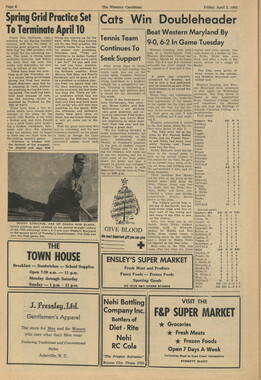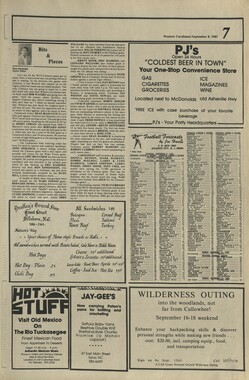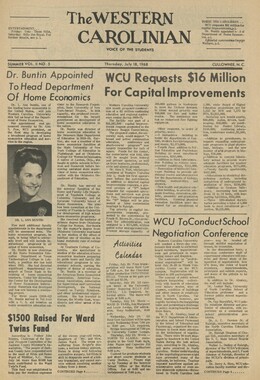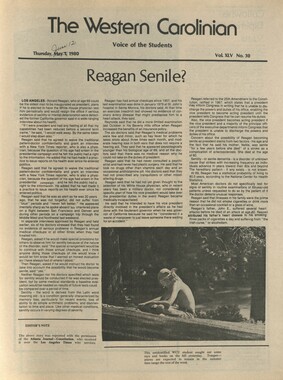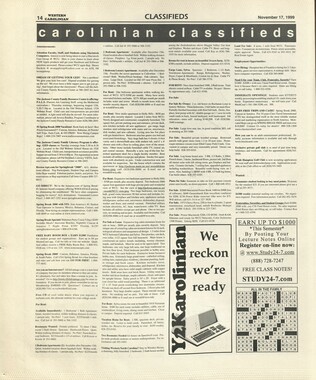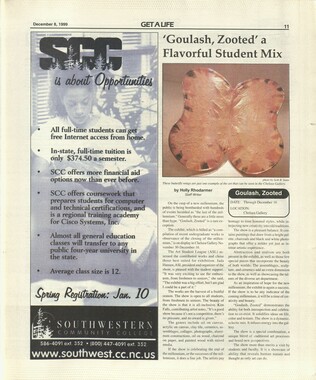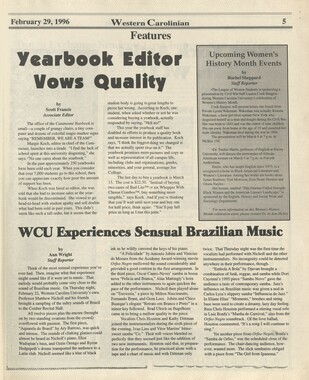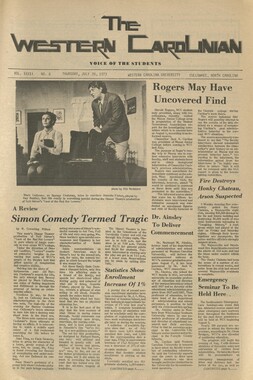Western Carolina University (20)
View all
- Canton Champion Fibre Company (2308)
- Cherokee Traditions (291)
- Civil War in Southern Appalachia (165)
- Craft Revival (1942)
- Great Smoky Mountains - A Park for America (2946)
- Highlights from Western Carolina University (430)
- Horace Kephart (941)
- Journeys Through Jackson (159)
- LGBTQIA+ Archive of Jackson County (85)
- Oral Histories of Western North Carolina (314)
- Picturing Appalachia (6873)
- Stories of Mountain Folk (413)
- Travel Western North Carolina (160)
- Western Carolina University Fine Art Museum Vitreograph Collection (129)
- Western Carolina University Herbarium (92)
- Western Carolina University: Making Memories (738)
- Western Carolina University Publications (2491)
- Western Carolina University Restricted Electronic Theses and Dissertations (146)
- Western North Carolina Regional Maps (71)
- World War II in Southern Appalachia (131)
University of North Carolina Asheville (6)
View all
- Allanstand Cottage Industries (62)
- Appalachian National Park Association (53)
- Bennett, Kelly, 1890-1974 (1463)
- Berry, Walter (76)
- Brasstown Carvers (40)
- Carver, George Washington, 1864?-1943 (26)
- Cathey, Joseph, 1803-1874 (1)
- Champion Fibre Company (233)
- Champion Paper and Fibre Company (297)
- Cherokee Indian Fair Association (16)
- Cherokee Language Program (22)
- Crowe, Amanda (40)
- Edmonston, Thomas Benton, 1842-1907 (7)
- Ensley, A. L. (Abraham Lincoln), 1865-1948 (275)
- Fromer, Irving Rhodes, 1913-1994 (70)
- George Butz (BFS 1907) (46)
- Goodrich, Frances Louisa (120)
- Grant, George Alexander, 1891-1964 (96)
- Heard, Marian Gladys (60)
- Kephart, Calvin, 1883-1969 (15)
- Kephart, Horace, 1862-1931 (313)
- Kephart, Laura, 1862-1954 (39)
- Laney, Gideon Thomas, 1889-1976 (439)
- Masa, George, 1881-1933 (61)
- McElhinney, William Julian, 1896-1953 (44)
- Niggli, Josephina, 1910-1983 (10)
- North Carolina Park Commission (105)
- Osborne, Kezia Stradley (9)
- Owens, Samuel Robert, 1918-1995 (11)
- Penland Weavers and Potters (36)
- Roberts, Vivienne (15)
- Roth, Albert, 1890-1974 (142)
- Schenck, Carl Alwin, 1868-1955 (1)
- Sherrill's Photography Studio (2565)
- Southern Highland Handicraft Guild (127)
- Southern Highlanders, Inc. (71)
- Stalcup, Jesse Bryson (46)
- Stearns, I. K. (213)
- Thompson, James Edward, 1880-1976 (226)
- United States. Indian Arts and Crafts Board (130)
- USFS (683)
- Vance, Zebulon Baird, 1830-1894 (1)
- Weaver, Zebulon, 1872-1948 (58)
- Western Carolina College (230)
- Western Carolina Teachers College (282)
- Western Carolina University (2008)
- Western Carolina University. Mountain Heritage Center (18)
- Whitman, Walt, 1819-1892 (10)
- Wilburn, Hiram Coleman, 1880-1967 (73)
- Williams, Isadora (3)
- Cain, Doreyl Ammons (0)
- Crittenden, Lorraine (0)
- Rhodes, Judy (0)
- Smith, Edward Clark (0)
- Appalachian Region, Southern (2569)
- Asheville (N.C.) (1923)
- Avery County (N.C.) (26)
- Blount County (Tenn.) (195)
- Buncombe County (N.C.) (1672)
- Cherokee County (N.C.) (283)
- Clay County (N.C.) (555)
- Graham County (N.C.) (236)
- Great Smoky Mountains National Park (N.C. and Tenn.) (519)
- Haywood County (N.C.) (3569)
- Henderson County (N.C.) (70)
- Jackson County (N.C.) (4912)
- Knox County (Tenn.) (35)
- Knoxville (Tenn.) (13)
- Lake Santeetlah (N.C.) (10)
- Macon County (N.C.) (420)
- Madison County (N.C.) (215)
- McDowell County (N.C.) (39)
- Mitchell County (N.C.) (132)
- Polk County (N.C.) (35)
- Qualla Boundary (982)
- Rutherford County (N.C.) (76)
- Swain County (N.C.) (2182)
- Transylvania County (N.C.) (270)
- Watauga County (N.C.) (12)
- Waynesville (N.C.) (86)
- Yancey County (N.C.) (72)
- Aerial Photographs (3)
- Aerial Views (60)
- Albums (books) (4)
- Articles (1)
- Artifacts (object Genre) (228)
- Bibliographies (1)
- Biography (general Genre) (2)
- Cards (information Artifacts) (38)
- Clippings (information Artifacts) (191)
- Copybooks (instructional Materials) (3)
- Crafts (art Genres) (622)
- Depictions (visual Works) (21)
- Design Drawings (1)
- Drawings (visual Works) (185)
- Envelopes (73)
- Exhibitions (events) (1)
- Facsimiles (reproductions) (1)
- Fiction (general Genre) (4)
- Financial Records (12)
- Fliers (printed Matter) (67)
- Glass Plate Negatives (381)
- Guidebooks (2)
- Internegatives (10)
- Interviews (815)
- Land Surveys (102)
- Letters (correspondence) (1013)
- Manuscripts (documents) (618)
- Maps (documents) (177)
- Memorandums (25)
- Minutes (administrative Records) (59)
- Negatives (photographs) (6090)
- Newsletters (1290)
- Newspapers (2)
- Notebooks (8)
- Occupation Currency (1)
- Paintings (visual Works) (1)
- Pen And Ink Drawings (1)
- Periodicals (193)
- Personal Narratives (10)
- Photographs (12976)
- Plans (maps) (1)
- Poetry (5)
- Portraits (4568)
- Postcards (329)
- Programs (documents) (181)
- Publications (documents) (2443)
- Questionnaires (65)
- Relief Prints (26)
- Sayings (literary Genre) (1)
- Scrapbooks (282)
- Sheet Music (2)
- Slides (photographs) (402)
- Songs (musical Compositions) (2)
- Sound Recordings (796)
- Specimens (92)
- Speeches (documents) (18)
- Tintypes (photographs) (8)
- Transcripts (322)
- Video Recordings (physical Artifacts) (23)
- Text Messages (0)
- A.L. Ensley Collection (275)
- Appalachian Industrial School Records (7)
- Appalachian National Park Association Records (336)
- Axley-Meroney Collection (2)
- Bayard Wootten Photograph Collection (20)
- Bethel Rural Community Organization Collection (7)
- Blumer Collection (5)
- C.W. Slagle Collection (20)
- Canton Area Historical Museum (2110)
- Carlos C. Campbell Collection (462)
- Cataloochee History Project (64)
- Cherokee Studies Collection (4)
- Daisy Dame Photograph Album (5)
- Daniel Boone VI Collection (1)
- Doris Ulmann Photograph Collection (112)
- Elizabeth H. Lasley Collection (1)
- Elizabeth Woolworth Szold Fleharty Collection (4)
- Frank Fry Collection (95)
- George Masa Collection (173)
- Gideon Laney Collection (452)
- Hazel Scarborough Collection (2)
- Hiram C. Wilburn Papers (28)
- Historic Photographs Collection (236)
- Horace Kephart Collection (861)
- Humbard Collection (33)
- Hunter and Weaver Families Collection (1)
- I. D. Blumenthal Collection (4)
- Isadora Williams Collection (4)
- Jesse Bryson Stalcup Collection (47)
- Jim Thompson Collection (224)
- John B. Battle Collection (7)
- John C. Campbell Folk School Records (80)
- John Parris Collection (6)
- Judaculla Rock project (2)
- Kelly Bennett Collection (1482)
- Love Family Papers (11)
- Major Wiley Parris Civil War Letters (3)
- Map Collection (12)
- McFee-Misemer Civil War Letters (34)
- Mountain Heritage Center Collection (4)
- Norburn - Robertson - Thomson Families Collection (44)
- Pauline Hood Collection (7)
- Pre-Guild Collection (2)
- Qualla Arts and Crafts Mutual Collection (12)
- R.A. Romanes Collection (681)
- Rosser H. Taylor Collection (1)
- Samuel Robert Owens Collection (94)
- Sara Madison Collection (144)
- Sherrill Studio Photo Collection (2558)
- Smoky Mountains Hiking Club Collection (616)
- Stories of Mountain Folk - Radio Programs (374)
- The Reporter, Western Carolina University (510)
- Venoy and Elizabeth Reed Collection (16)
- WCU Gender and Sexuality Oral History Project (32)
- WCU Mountain Heritage Center Oral Histories (25)
- WCU Oral History Collection - Mountain People, Mountain Lives (71)
- WCU Students Newspapers Collection (1923)
- Western North Carolina Tomorrow Black Oral History Project (69)
- William Williams Stringfield Collection (2)
- Zebulon Weaver Collection (109)
- African Americans (390)
- Appalachian Trail (35)
- Artisans (521)
- Cherokee art (84)
- Cherokee artists -- North Carolina (10)
- Cherokee language (21)
- Cherokee pottery (101)
- Cherokee women (208)
- Church buildings (189)
- Civilian Conservation Corps (U.S.) (111)
- College student newspapers and periodicals (2012)
- Dams (107)
- Dance (1023)
- Education (222)
- Floods (61)
- Folk music (1015)
- Forced removal, 1813-1903 (2)
- Forest conservation (220)
- Forests and forestry (1184)
- Gender nonconformity (4)
- Great Smoky Mountains National Park (N.C. and Tenn.) (181)
- Hunting (45)
- Landscape photography (25)
- Logging (119)
- Maps (83)
- Mines and mineral resources (8)
- North Carolina -- Maps (18)
- Paper industry (38)
- Postcards (255)
- Pottery (135)
- Railroad trains (72)
- Rural electrification -- North Carolina, Western (3)
- School integration -- Southern States (2)
- Segregation -- North Carolina, Western (5)
- Slavery (5)
- Sports (452)
- Storytelling (243)
- Waterfalls -- Great Smoky Mountains (N.C. and Tenn.) (66)
- Weaving -- Appalachian Region, Southern (280)
- Wood-carving -- Appalachian Region, Southern (328)
- World War, 1939-1945 (173)
The Reporter, August 2005
-
The Reporter is a publication produced by Western Carolina University featuring news, events, and campus community updates for faculty and staff. The publication began in August of 1970 and continues digitally today. Click on the link in the “Related Mate
-
-
Opening Assemblv set lor August 18 Jay Leno won't be the first person to grace the stage of Western's new Fine and Performing Arts Center. after all. That honor will fall to Chancellor John W. Bardo, who will launch the 2005-06 academic year with an Opening Assembly for all university faculty and staff Thursday, Aug. 18. A reception will begin at 8:30 a.m., with the assembly scheduled to start at 9 a.m. in the performance hall. This fall marks a change from years past, when the chancellor 's traditional opening-of-the-schoolyear remarks coincided with the annual Fall General Faculty Meeting, an event attended primarily by faculty members. "We want everyone who plays such a critical role in both the learning and living environments of the university to be included in this important campus event." said Dianne Lynch. chief of staff. "This is typically the time when Dr. Bordo reminds us of the accomplishments of the past year and outlines the challenges of the coming years. It is important that faculty and staff alike have the opportunity to participate." Un1versity administrators ore inviting all faculty and staff members to the assembly. and are encouraging supervisors to allow their employees to attend. Shuttle service will be available. The annual Fall General Faculty Meeting. which includes remarks from the chair of the Faculty Senate and Western's representative to the University of North Carolina Faculty Assembly, will be at 10:45 a.m. that day, also in the Fine and Performing Arts Center. Leno, a nationally known comedian and host of NBC's "The Tonight Show," will have to wait a couple more months for his time on the stage. The opening night gala for the Fine and Performing Arts Center is set for Saturday, Oct. 22. August 15, 2005 • ..... ,,_Portal on the Prowl My Cat, Western's new online oommunity, is pouncing . . onto the campus scene just in time for the 2005 fall semester. Replacing Cyben::at Pipeline, the My Cat portal is designed to engage the Western community through authent:J.~ate~ access to appropriate online services, personalized information, university commurucat:J.ons and collaborative tools, said Jed Tate, Web developer for Western and project manager for My Cat. Offerin~ the .s~e servic~s as the previous CyberCat Pipeline with similar navigation tools, My Cat will bnng 1ts users mcreased ease of usability and more options for customization Tate said. My Cat offers convenient access to Western's online services and business ' information with a current university user identification and password and allows users to receive important university dates, deadlines and announcements. Users also may customize My Cat, choosing the additional news and information they want to receive. The new portal is the result of a joint effort by a variety of Western students, faculty and staff who h~ve colla~rated in conceptualizing and creating My Cat, said Erin Bradley, a c~mputer informat:J.on systems major from Burke, Va., and one of the students working behind the scenes on the portal project. :·we wanted My Cat to be an application that is useful and friendly for all its users," srud Bradley, who also works in Western's Web Office of Web Management. "The ability to c~sto~ze the layout. of My Cat makes the user feel as though they own a piece of this appltcat:J.on and may drive more to use it." Many d~partments have set up Web logs (better known as "blogs") for My Cat, and users can subscnbe to those blogs to keep up-to-date on specific events or programs of interest she said "As a student sitting on a couple of the committees that created My Cat, it was exci;ing to se~ how many depart:J.nents and various administrative areas were eager to be involved in creat:J.ng an application that is going to set itself apart by essentially being a students ' best resource for personal information, campus events and much more." My Cat for students and faculty is available as of Aug. 10; access for staff is planned for later in the fall semester. . Students may click on the "Current Students" link from the Western homepage to be taken mto the v:u~ One Stop site. O~ce there, they will log in as usual and enter the new My Cat portal. A link mto My Cat al so w11l be available on the faculty and staff page. For more information on My Cat, visit mycat.wcu.edu or contact Jed Tate, Web developer, at 227-2431, or Bob Orr, associate chief information officer, at 227-77132. Project Management Director Earns Fulbright Chair Jeanne Dorle, assistant professor in the department of management and international business at Western, has been named the Fulbright Research hair in Project Management at the University of Quebec. "Dr. Dorle is an exceptional scholar whose research will greatly contribute to our under tanding of strategic problem solving in a business context," said Michael K. Hawes, executive director of the anada-U.S. Fulbright Program. "l am pleased to welcome Dr. Dorle to the distinguished group of Fulbright scholars." A member of the faculty since 2002, Dorle brings to the classroom a background in law, professional management and training, and project management. ln her current research, she is working to document diversity in thinking styles and problem-solving approaches and their impact on the success of project teams in business settings. Jeanne Dorle education technology advisory council and chairs a committee for multimedia educational resources for Learning and online teaching. "This is an honor for Jeanne Dorle and for Western Carolina's management and international business department," said Kyle Carter, provost at Western. "In fact, it's quite an honor for all of our faculty members at Western because we have excellent professors who deserve the recognition that a Fulbright brings. I know that this Fulbright award will enrich Dr. Dorle's academic credentials and provide her with valuable crosscultural experiences that she can share with our faculty and students. We hope that her time at the University of Quebec will lead to opportunities for our students and faculty to collaborate with their Canadian colleagues." Long regarded as the world's premiere academic exchange program, the Fulbright attracts exceptional scholars from more than 150 countries worldwide. She recently completed the certification program to administer the Kirton AdaptorInnovator Inventory (which measures the creativity, problem-solving and decision-making styles of individuals within organizations), and will continue to collaborate with its originator, Michael Kirton, during her Fulbright experience. Director of Western's graduate program in project management, Dorle has a record of active participation in the Project Management Institute, where she has served in leadership roles. She has experience in the design and delivery of synchronous and asynchronous online instruction. She serves on Western's Among the fastest growing of the bilateral exchanges is the Canada-U.S. Fulbright Program. Named for former U.S. Sen. J. William Fulbright and supported by the Department of Foreign Affairs Canada and the U.S. Department of State, the CanadaU. S. Fulbright Program has engaged more than 600 scholars in high-level academic exchanges since 1990. Anonvmous UnlversltV Emploveelakes Gm To Stan Forum ScholarshiP Fund An endowed scholarship fund designed to help the children of staff members attend Western is one step closer to reality, thanks to the contribution of $2,000 from an anonymous university employee. With the contribution, the recently established Staff Forum Scholarship Fund stands at about $4,000- still short of the goal of $10,000 that is necessary to create an endowed fund. "On behalf of the members of the Staff Forum and all employees at Western, I would like to thank our benefactor for making this significant contribution to our scholarship fund," said Terry Riouff, Staff Forum chair. "Although the donor is an SPA employee who wishes to remain anonymous, I can say that this contribution was made in part to help encourage other employees to give. We realize that times are tough for staff members, but even a small monthly contribution of $5 through payroll deduction will go a long way toward achieving our goal of being able to start awarding scholarships to a deserving student," Riouff said. The Staff Forum is planning to hold a scholarship fundraising event as part of the annual Mountain Heritage Day. set for Saturday, Sept 24. Details will be announced later. Employees also may make contributions to the Staff Forum Scholarship Fund through the Family Campaign, and may do so through payroll deduction. ''We all know that scholarships make it possible for young people to attend college who might not otherwise be able to afford to do so," said Brett Woods, director of annual giving and special gifts. "That is our hope with the Staff Forum Scholarship- to help the children of our fellow staff members attend Western." For more information about the Staff Forum Scholarship Fund, contact the Office of Annual Giving at (828) 227-7124, or go to www.wcu.edu/Advancement/anuualgiving. Forms are available online or from the office at 401 H.F. Robinson Administration Building. August 15, 2005 • The Reporter • page 2 wuu Aug. 15 -Aug. 29, 2005 Monday, August 15 Orientation- new faculty: "Wellness for You and Your tudents Matters." 8:30 a.m.- noon. University enter. (227-7495) Workshop- Web T Proficiency Level I, an introduction to Weber. 2-4 p.m. Room 406, Belk Building. (http://paws. wcu.edu/etech/workshops/signup.a px) Tuesday, Wednesday, Thursday August 16, 17, 18 Workshop- WebCT Proficiency-Level II. Level I or equivalent experience prerequisite. August 16 and 18, 1- 3 p.m.; August 17, 2-4 p.m. Room 406, Belk Building. (http:/ /paws. wcu.edu/etech/ workshops/signup.aspx) Wednesday, August 17 Meeting- deans meet with department heads. 9 a.m.- noon. (227-7495) Workshop- USI 130. 9 a.m.-3 p.m. Hospitality Room, Ramsey Center. (227-7495) Meeting- Faculty Senate Planning Team. Noon- 2 p.m. Mary Will Mitchell Room, Brown Cafeteria. (227-7495) Thursday, August 18 Opening Assembly- for fall semester. Reception, 8:30a.m.; assembly and chancellor's opening address, 9 a.m. Performance Hall, Fine and Performing Arts Center. (227 -7100) General faculty meeting. 10:45-noon. Performance Hall , Fine and Performing Arts Center. (227-7495) Meeting- WCU Macintosh Users Group. Participants should bring lunch. Noon. Cardinal Room, University Center. (frady@email. wcu.edu) Meetings-departmental faculty. 1- 3 p.m. (227-7495) Information session - and registration for fall semester for Programs in Asheville. 4:30-6:30 p.m. Karpen Hall , University of North Carolina- Asheville. (828-251 -6642 or 800-369-9854 or http:// westemgrad.com) Friday, August 19 Meetings - c liege facultie . 9- 11 a.m. (227-7495) Meeting- Fa ulty enate. 1- 2:30 p.m. Lecture Hal l, Fine and Performing Arts enter. (227-7495) Meeting- open faculty caucus. 3- 5 p.m. Lecture Hall, Fine and Performing Arts enter. (227-7495) Concert- Dwight Yoakam, with special guest the Charlie Daniels Band. Benefit concert for Habitat for Humanity and other local charities. 7:30p.m. Ramsey Center. (227-7206 or 866-WCU-FEST) Saturday, August 20 Residence halls open to freshmen only. 9 a.m. (227-7303) Workshop- Jumpstart computer training for freshmen . 2- 8 p.m. (227-7487) Sunday, August 21 Orientation - for freshmen. 8 a.m.-5 p.m. (227-7087) Residence halls open for all students. 10 a.m. (227-7303) Workshop- Jumpstart computer training for freshmen. Noon- 8 p.m. (227-7487) Spring into Summer- "Stream Watch." 2:30-3:30 p.m. Mountain Heritage Center, Robinson Administration Building. (227-7129) Advising and registration - for freshmen. 2:15- 5 p.m. (227-7170) Monday, August 22 Advising - for transfer students. 8 a.m.-3 p.m. (227-7170) Workshop- Jumpstart computer training for freshmen. 8 a.m.-8 p.m. (227-7487) Orientation - for transfer students. Registration required. (227-7087, orientation@email .wcu.edu, or www.wcu.edu/orientation) Registration - for transfer students. Begins 11 :30 a.m. (227-7232) Luncheon- welcome tun h for new faculty. Noon. ou lter Faculty enter, Hunter Library. (227-7495) Departmental open houses- freshmen meet with advisers. 3- 5 p.m. Barbecue- Honors ollege. 7-8:30 p.m. Reynolds Hall lobby and front lawn. (227-7383) Tuesday, August 23 Orientation - for new graduate students. 8:15 a.m.-noon. Recital Hall , Coulter Building. (227-7398) Registration and drop/add in Cullowhee. 9 a.m.-4 p.m. (227-7232) Workshop- for graduate teaching assistants. 1:30-3 p.m. Multipurpose Room, University Center. (227-7495) Freshman convocation- The Honorable Ranandra Sen, ambassador of India to the United States. 3:30-5 p.m. Ramsey Center. (227-7087) Valley Balleyhoo. 5 p.m. University Center lawn. (227-7206) Wednesday, August 24-Tuesday, August 30 Late registration and schedule changes in Cullowhee. (227-7232) Wednesday, August 24 All classes begin. (227-7495) Thursday, August 25 Dance Gathering- informal gathering for traditional dance. No experience necessary; square dancers and buck dancers invited to teach steps to other participants. 7-9 p.m. Grandroom, University Center. (227-7129 or 227-7206) Sunday, August 28 Crafts at the Center- "Gourds" with Doris Pannell. 2-4 p.m. Mountain Heritage Center, Robinson Administration Building. (227-7129) Submissions: Serul news items and calendar notices to WCU Calerular, 1601 Ramsey Cenur Western Carolina University Cullowhee, NC 28723 or e-mail to: Reporter@email.wcu:edu. Submit items for the university s online calendar aJ least one week prior to the event. August IS, 2005 • The Reporter • page 3 Planning Under Wav tor HISPANIC HERITAGE MONTH The second annual Western North Carolina Hispanic Heritage Month Celebration cosponsored by Western is scheduled for Sept. 16 through Oct. 15, with a variety of activities centered on the theme "Hispanic Americans: Strong and Colorful Threads in the American Fabric." The month of free programs will kick off Friday, Sept. 16, with an opening celebration at 7:30p.m. in the Grandroom of the A.K. Hinds University Center on the Western campus. Patrick Tapia, director of the Latino Advocacy Coalition Center in Hendersonville, will deliver the keynote address. Musical entertainment and performances of traditional Hispanic dances also are expected to be part of the evening. The opening celebration is co-sponsored by Western's Office of Multicultural Affairs and Office of International Programs and Services. Other activities will be held throughout the month-long celebration at sites in Haywood, Jackson, Macon and Swain counties. Topics will include Latino contributions and challenges in American society; Latino art and culture; community interaction; and personal stories and histories. A detailed schedule will be available later. "Hispanic Heritage Month is a way to promote and celebrate friendly awareness and understanding of the Hispanic historical and cultural presence in the United States and in our home counties of Jackson, Macon, Swain and Haywood," said Patricia Hackett, organizer of the event and visiting assistant professor of Spanish at Western. "We also want to encourage involvement of the Hispanic community in the activities of the counties in which they live, which will help foster greater understanding of the Hispanic people in WNC." Hackett, a native of Panama, said the month is designed in part to help shatter myths and stereotypes about Hispanic people. "We are not all field workers," she said. "We do not all like to eat fajitas and frijoles." Organizers are still putting the finishing touches on the month's schedule of activities, and are seeking voltmteers from the community to assist in planning and implementing events. Planning meetings are set for 7 p.m. Thursday, Aug. 18, at the Haywood County Public Library in Waynesville; 7 p.m. Wednesdays, Aug. 24 and 31, in the Hinds University Center at WCU; 7 p.m. Thursday, Sept. 8, at Haywood County Public Library; and 7 p.m. Wednesday, Sept. 14, at Hinds University Center. Other sponsors of Hispanic Heritage Month activities include the Jackson County Multicultural Task Force, Jackson County Family Resource Center, Jackson County Library, Solidaridad Latino Outreach Center of Franklin, COLA- Latino American Coalition from Asheville, Mosaic Multi-Cultural Center of Waynesville, Jackson County Health Department, Manos Latinas women's advocacy group of Haywood County, Smoky Mountain Vicariate Roman Catholic Hispanic Ministry, Jackson County Public Schools, Jackson County Arts Council, the town of Sylva, and Western's Mountain Heritage Center, Fine and Performing Arts Center and department of modern foreign languages. For more information, call Patricia Hackett at (828) 227-3761. The Reporter is published by the Office of Public Relations. Mail faculty/staff notes, events, notices, and changes of address to: The Reporter, 160 I Ramsey Center, or send them via e-mail to: Reporter@email.wcu.edu. I ,800 coptes of this public document were pnnted at a cost of $3'29.1 S, or $0.18 per copy. Western Carolina University is an Equal Opportumty Institution. ~Iteporter Office of Public Relations Publications De pa rtment 160 I Ramsey Center Cullowhee, NC 28723 -~""' ~"-~ .. , I August I 5, 2005 • The Reporter ... NON-PROm ORG. U.S. POSTAGE PAID CULLOWHEE, N.C. PERMIT N0. 1 August 29, 2005 News for the Faculty and Staff of Western Carolina University Chancellor Outlines Challenges 01 Coming Year and Decade Dr. John W. Bardo, chancellor Welcome to the Opening Assembly. In preparing this address, it became apparent that I should talk today about two thrusts. First, there are some very important activities in which we need to engage this year. These activities need to be dealt with before the longer-range issues can be managed. Second, there are many profound changes in the conditions that affect the institution over the next decade, and I think it is important that most of this morning be spent on these longer range issues. A few of these broader issues are new; most, however, represent a "re-framing" of activities in which we have been engaged for the last several years. They are complex and involve responding to changing world and regional conditions. Let's turn, then, to the work of this year. CURRENT YEAR ACTIVITIES _________________Ch a_nc_:_e:-l-l-o--_r Jo--h---n-----B_:__:a_r_d::_o::__-m----=ak.:e.::.s_:__h:___::is___::o:.:.:p::e.n.::i:n.:g::..:a::d:::dre-=:ss The single most important activity of this year is to position ourselves to receive SACS reaffirmation of accreditation. No area of the institution is exempt from review, and all areas must have clear plans for quality improvement. We must do well with this accreditation review. SACS The single most important activity of this year is to position ourselves to receive SACS reaffirmation of accreditation. Second, we must continue to address issues regarding enrollment. We are a focused growth institution, now bas very high standards focusing on targeted quality enhancement. Carol Burton and her committees will be working on this issue all year, so please participate and expect to be involved in the re-accreditation process. Of particular importance in reaccreditation is the development of effective assessment programs. From talking with the people working on SACS, there is real concern about our level of activity with regard to assessment. We must assure ourselves that we are taking every necessary action to develop and implement effective assessment plans in all areas of the institution. To help us with this effort, we will be hiring a new director of assessment. and increasing enrollment is the key to every other element in our future. This year, Western's enrollment will increase, but not quite at the rate that we have seen in past years. While we have not leveled off in enrollment, this year can be seen as a time of consolidation. We are consolidating our gains and we are seeking to position ourselves for the next critical developmental phase of the institution. But, there are expectations that we will continue to grow at a reasonably rapid rate. This means there will be renewed emphasis on enrollment. I have asked Provost Carter to bring together an enrollment management team to focus on recruiting new undergraduate and graduate students, to improve student retention, and to enhance institutional student-oriented marketing. Newt Smith, acting on behalf of the Faculty Senate, reminded me that our enrollment gains will have major implications for the surrounding community. Therefore, I will appoint a chancellor's taskforce of appropriate university representatives to meet regularly with the community. Additionally, Dianne Lynch, my chief of staff, will continue to repre- Faculty and staff pack the lobby of the Rne and Performing Arts Center prior to the Opening Assembly. Because SACS emphasizes planned quality improvement, it is increasingly important that we clearly link our strategic planning and budgeting processes. Therefore, this year, I am looking to restructure two important advisory committees, the Strategic Planning Committee and the Chancellor's Budget Advisory Committee, to bring them into closer alignment. continued on Page 2 continued from Page 1 sent me at official meetings, including Studies has been very successful, but there are issues that need to be addressed. at the local level, we must continue to make funds available within the state's the local Board of framework. County Commissioners, to assure we are in regular discussion with our elected officials. Whenever possible, we want to minimize any potential negative effects of growth while promoting its more positive aspects Finally, I remain deeply concerned with the costs of health insurance for all of our employees. Vice Chancel-lor for External Affairs Clifton Metcalf, Torn McClure, and I have expressed to our legislators our concerns, especially with the costs of family coverage. Please understand we are being received well, but like all of us, the legislature is not sure how to create a viable solution. We will continue to work on this issue and see if improvements can be made. Whenever possible, we want to minimize any potential negative effects of growth while promoting its more positive aspects. As Kyle Carter and I visited with each division last year, we heard a number of comments regarding the desire to have systems that work well, and the need to reduce unnecessary bureaucracy and paper work. It is clear we need to work through a restructuring of the terms of appointments of our department heads. Kyle and the deans will be developing department head contracts that extend into the summer. This will allow more effective management at the departmental level, as well as create better availability of the department head in the summer when so many issues arise with new students and with graduate programs. We also will examine how to minimize steps in various internal processes to see where we can eliminate duplication. More broadly, it is time to examine the structure of our colleges. Enrollment growth brings with it a need for bet-ter mid-level organization that enables academic departments to do their basic jobs of teaching, scholarship, and service. There is no one answer to the form of organization. This is truly a case where "form should follow function." This also is a time when the institution needs to consider a different structure for its grants and contracts operations. At this institution, the grants office has functioned as a subsidiary of the graduate school. When we were a small institution that did little funded research, that was an appropriate model. However, as sponsored research and projects become more important to the institution, it is not unusual to restructure so that the research office reports directly to the provost. We need to look at this possibility. I am asking Kyle Carter to look at our support for international students and how we can improve the international content, focus, and experience of our educational programming. It is clear we need to much better integrate international programming and support into the mainstream of the institution. Globalization and internationalization are increasingly important to us as an institution. We need to make some corrections to our Liberal Studies Program. Liberal These issues involve the ability to repeat the freshman seminar and the extensive waivers of upper division liberal studies elective classes. Later in the talk, I will address a broader review of our general education requirements that we should consider once we conclude the SACS review. Until we have successfully completed SACS, we need not take on anything as complex as general education. This year, we need to finish the master plan for the Millennium Campus so we can receive Board of Governors' permission to begin developing the project. This has been a long time in corning and we need to get the project under way. It will make a huge difference in the future of this institution and this region. We also need to revise our current master plan. Over the last six months, it has become clear that several buildings in the middle of campus need to be replaced. Specifically, Dodson Cafeteria and Helder and Leatherwood residence halls are too This is a significant agenda, but it focuses on key issues that need immediate attention. ISSUES FOR THE NEXT DECADE I now want to tum to a more broadranging conversation regarding the future direction of Western. I think you will see that the roots of much of what we need to accomplish have been well-grounded in the work of the last several years. Please understand that what I am about to discuss is a multi-year focus based on current international and regional conditions. In the last five years, the world has changed a lot. We need to adjust our direction- not costly to renovate to current standards. Therefore, new facilities must be built. This will give us an opportunity to rethink the structure of the quad now taking This concept, creating human capital, is at the core of what is expected of a 21st-century university shape in the center of campus. There is another major transition under way that has occupied many staff hours - the migration of our computerized business systems to SCT Banner. Banner has the potential of greatly improving the efficiency and effectiveness of our business practices so we can serve our people better. I urge each of you involved in this very important initiative to use the conversion to Banner as a time to improve our business processes so we are able to "work smarter, not harder." Last year, I appointed a budget policy advisory committee that worked most of the spring term to advise me on policies we should use to distribute new resources in this year's budget. We are implementing those recommendations, and I want to particularly comment on one. All members of the committee were very concerned about SPA salaries. Therefore, based on their recommendations, I am placing $300,000 of our new funding into a reserve account to fund SPA promotions and in-range adjustments. Even though we do not control SPA salary policies August 29, 2005 • The Reporter • page 2 change directions-to account for what we now know. I titled this talk "Creating Human Capital: An Agenda for the Decade Ahead." This concept, creating human capital, is at the core of what is expected of a 21"-century university. I am not suggesting we move education away from our liberal arts roots; quite to the contrary. What I am suggesting is that .we need to re-frarne our educational enterpnse to address the fundamental, core changes in the expectations of society regardin~ higher education. · We have been working at this transformation since 1996, and we are making great progress. Moreover, we are well-positioned to take the next critical steps. To begin, it is important to remember that Western is a regional university. We are primarily oriented to serving the needs of the people of the western third of th~ state. While some characteristics of this region may be unique, the problems being faced by the people of the area represent specific manifestations of classes of problems being faced by people throughout the state and nation. Therefore, as a regional university it is appropriate for us to draw students from outside the region. We can offer them an excellent education and give them experiences that can be generalized to solving whole classes of problems. This is why in describing Western, I'll often say our job is to "serve the region and educate the state." Focusing on the nature of regions, the future of economic prosperity for missions." What i most important about this definition is that it recognizes engagement as an intellectual, cholarly approach to addressing higher education's tri-partite mis ion of teaching, research, and service. That is, engagement is an approach, not a new mission for education. It combines practice and theory so that students who engage are better educated than students who do not engage. It assures that the work of faculty is cholarly and profe sional. It builds on academic strengths and it recognizes the importance of the nature of the discipline, profession, or area. Engagement fits the core mi ion of a regional university. As that produce good and service that are valued in other regions, nations, or parts of the world. Economic globalization and the need for regions to compete glob-ally will be the mo t significant defin-ing characteristic of the next 30 or more years-possibly through the remainder of this century. It will be the dominant "organizing principle" for mo t international relationships and, more importantly, it will fundamentally determine the quality of life for our children and grandchildren. One of the more interesting works on globalization is Thomas Friedman' "The World is Flat." I now want to show you the United States will be based on the relationships between naturally occurring economic regions and world economic conditions. Those of us in higher education must be key participants in regional development through strong engagement, partnerships, technology transfer, education, and through direct contributions to the quality of life. Therefore, the fact that Western is a regional university is of utmost importance. It is also clear that if we are regional, we dare not be parochial. As a university, we have responsibility a regional institution, we draw much of our meaning and institutional life from the surrounding area and its peoples and cultures. Bill Gates is the Britney Spears of China and Britney Spears is, well, the "Britney Spears" of the United States -Friedman to link our abilities and services to the needs of the people of the region, but must do so in a manner that reflects changing world conditions. Last year, I talked about the concept of "engagement" and how important it would be to our future. This apparently struck a chord with the campus because engagement became a strong topic of conversation, and I anticipate that engagement will become a defining concept for our university as we focus and address the requirements by SACS to create a Quality Enhancement Plan. This summer, I spent a great deal of time reading about a number of issues related to regional development and engagement. Two reports from Michigan State University deal systematically with what they term "outreach." The way they frame this concept, it is clearly what I mean when I speak of engagement. According to Michigan State, what we term as engagement can be defined: " ... as a form of scholarship that cuts across teaching, research, and service. It involves generating, transmitting, applying, and preserving knowledge for the direct benefit of external audiences in ways that are consistent with university and unit In today's world, we also have responsibility to work with the people of the region to improve their economic future. This is the primary reason for trying to develop ways of "thinking differently" about the nature of the university. It also is why in the spring I began to talk about creating a "Millennial Initiative." This initiative will result in developing a "Millennium Campus," but more importantly, it is an effort to give name to a concept of a university grounded in the needs of the people it serves while focusing its education and processes on the future. If we are successful in creating a futureoriented institution that ties traditional educational quality to emerging world and regional conditions, we will have a unique institution that will represent a model of 21"-century higher education. THE WORlD IS FlAT In the future, eco-nomic competitiveness and prosperity will be based fundamentally on the relationship between individual regions and world economic conditions. States and nations obviously have " ... Engagement ... a form of scholarship that cuts across teaching, research, and service. It involves generating, transmitting, applying, and preserving regulatory, safety, investment, and similar functions, but the actual economic engines that will drive our future most likely will be based in knowledge for the direct benefit of external audiences in ways that are consistent with university and unit missions." naturally occurring economic regions August 29, 2005 • The Reporter • page 3 two slides. One is Britney Spears, the other is Bill Gates. Why would I show you these two people? Well, as Friedman notes, Bill Gates is the Britney Spears of China and Britney Spears is, well, the "Britney Spears" of the United States. That may say it all. Friedman has a single message for all of us: America's wake up call is now. Throughout our history, our nation has been the land of opportunity. We see ourselves, and others have seen us, as a prosperous country. For most of our history we have cornered the market on prosperity. But all of that is at risk. The rest of the world is catching up. We now have a level playing field; that is, the world is flat. The race to translate research and technology into business opportunity is hotly competitive. We are neck and neck with other countries, and some competitors are surpassing us. As Friedman says so eloquently, when we were children, our parents told us to finish our dinner because there were children starving in China and India. Today, he tells his children to finish their homework because there are children in India and China who are starving for their jobs! What a change! According to the Wall Street Journal, China, India, Russia and Brazil could outrank the combined economic might of today's Group of Six-the United States, Japan, Germany, France, Italy and the United Kingdom-by the middle of this continued on Page 4 continued from Page 3 century. That represents a sea of change in economic condiGlobalization is not just an internationa1 tren d ' As an institution, we have begun to respond to the aging population. tions and the world econonilc it has huge personal impacts on each_ of us we have created programs in gerontol-power distribution that should every day. We will need to respond if we ogy, and through a generous gift from give each of us pau~e. Wh_at are to help this region develop. Wallace and Jeanette Hyde, have estab-are the causes of this massive transition? They are complex, but some of them have serious implications for us L ___ =-::....:.:....:.=-:~__:_ _:::. ___ --=.. ____ lished a Distinguished Professorship in as a university. Take the situation with regard to language and engineering education. In China there are 20 nilllion college students today-all of them are learning English. Only 60,000 of America's 17 million college students are studying Chinese. I have seen reports that there are more Chinese taking the SAT in English than there are Americans taking that same test. Second, it is estimated there will be 3.4 million degrees awarded in China this year-44 percent of them _will be in e~~ineering. In India, there will be 3.1 rmlhon graduates-as many as 22 percent of them in engineering. In the United States, there will be 1.3 million students who graduate, with only 6 percent of them in engineering. Think about the economic implications that has for the economic future of this country. Clearly, China and India are out-producing the United States both in the number of graduates and the number of graduates in critical fields. Although North Carolina is one of the few exceptions, we as a nation have not really responded and continue to limit funding for education at all levels. In many states, the total funding for education has declined. By our inability to design, implement, and fund appropriate models of education at all levels, we have great potential as a nation not only to lose ground, but to change fundamentally the future for our children and grandchildren. We are no longer in that privileged position as the unchallenged powerhouse of productivity and ingenuity. Our new situation in the balance of world economic power is a troubling concern at the federal, state, and just as importantly, at regional levels. How does internationalization and globalization affect every one of us? How many of you have had a friend or relative laid off? How many people do you know who have lost their homes and had to leave their communities as jobs are shipped overseas? Globalization is not just an international trend, it has huge personal impacts on each of us every day. We will need to respond if we are to help this region develop. THE CHANGING FACE OF WNC It is important for us to become more aware and knowledgeable of international issues. Kyle and I are interested in increasing our focus on international programming. Over the next couple years, you will have opportunities to -:vork ~n international education issues, mcludmg how to increase the number of international students at Western, how to increase the number of international experiences for our students, how to internationalize the curriculum, and how to encourage international faculty exchange. The second major trend that clearly will represent a significant defining characteristic of our times is increasing local population diversity. We are seeing it with the rise of the Hispanic population throughout most of the United States and, most particularly, in North Carolina. North Carolina has the fastest growing Hispanic population in the country. Growth of the Hispanic population represents a major change for this country, and this shift is only one phase of what will become increasing diversity that may involve increases in the numbers of Asians and Eastern Europeans. We also are seeing major in-migrations of people from other regions of the United States into North Carolina-which has the potential to shift ethnic composition and religious affiliation percentages. Similarly, in-migration in Western North Carolina has great potential to change the political structure of the region- it already has done so. Because of the quality of life offered in this region, we also can expect to see continuing increases in the number of older people who choose to live in Westem North Carolina August 29, 2005 • The Reporter • page 4 Gerontological Social Work. Pat Brown is developing a Senior College to promote advanced education among the region's older residents. Our faculty in engineering and physical therapy are working . toward establishing a center for adaptive device development. We're working with MAHEC and UNCA to create a Center for Health and Aging that will be a national model. There is another major change affecting this region. On the screen ~ou will see a series of maps of the regiOn that surrounds this institution. In our area of the country, state lines were developed in the early days of our nation. Much ~as changed and the functional bound~es of this region do not conform to state lines. The future of Western North Carolina is inextricably tied to the future of surround-ing states. . Turning to the slides, wh~t you se_e IS the median value of housing m counties surrounding Cullowhee in 1990. White and yellow define lower median prices and blue defines higher prices. In our general region, only Atlanta had highe~ hous-ing values. The rest of our regron was relatively inexpensive. . Look at what happened by 2000! High median housing values have followed paths out of Atlanta, Greenville-Spartanburg, and Asheville. As this map shows, the value of housing has increased more along the U.S. 441 corridor toward Macon and Jackson counties than it has along the Interstate 75 corridor toward Cha~nooga. Change in housing_pri~es of this magnitude is an important mdicator of the increasing impact our specific area of the state can expect from the Atlanta metropolitan region. The second set of maps is also very telling. On the screen is th~ ~ap of the 1990 Metropolitan Statistical Areas (MSAs) surrounding this region. The MSA is the most widely used federal definition of an urban area and it accounts for economic interdependencies among counties as well as population characteristics. The arrows indicate some growth trajectories in these regions that affect our area. Recently, the Bureau of ~e Cens~s has added a new urban form to Its defimtions to reflect changes in American se~!ement patterns: the "Micropolitan Area. A Micropolitan Area consists of a sm~ler city and its surrounding economically mte- grated areas. Take a look at the re-mapped metropolitan and micropolitan areas based on 2003 census analysis. This map startled me. Note that this region is surrounded by urban areas. Sitting in Cullowhee, we sometimes feel isolated, but we are not. We are in the center of an emerging conurbation t driven by Atlanta, Chattanooga, GreenvilleSpartanburg, Knoxville, Johnson City, and Asheville. This has huge implications that we are just now beginning to understand. Given the changes in this university, trends in retirement, distribution of high speed internet capacity, and increasing diseconomies of scale being experienced by Atlanta, I would predict that either Franklin or Sylva will become the hub of a micropolitan area within the next 10 to 20 years. Obviously, we can expect growth in the population. The only questions involve the quality of that growth and the role Western will play in assuring that we contribute to both preserving that quality of life and providing support for regional development that is meaningful and productive. Obviously, we can expect growth in the population. The only questions involve the quality of that growth and the role Western will play 1 lEY DIRECTIONS FOR WESTERN All of these trends suggest some key directions for work this year and over the next several years. First, once we complete SACS, we will need to again review our curricula and academic programs to assure we are meeting the emerging needs of our students and our state. We have an excellent Liberal Studies Program, but we will need to assure it reflects what we now know about such issues as globalization, internationalization, and cultural contact and conflict. The program also needs to be sufficiently flexible to encourage students to develop working, functional facility in languages other than English. The issues surrounding globalization, the critical need areas for job growth, and the shifting local situation also support the efforts we are making in increasing our technologically based programs of study. The world bas changed and we need to continue to change with it. Engineering and engineering-related disciplines will continue to play critical roles in help-ing this region regain prosperity. It is important for us to take the next steps in developing our joint computer engineering program with UNC-Charlotte. Western made an important organizational move last academic year by proposing to restructure its Department of Engineering and Technology into a School of Technology within the College of Applied Sciences. This reorganization was approved by the Board of Governors last week. This restructuring will allow us to bring better coordination to our efforts and it will improve greatly our ability to assist this region. Returning to the globalization is-sue, as we progress over the next several years, Western needs to look carefully at establishing a formal program for developing interdisciplinary majors that might well be unique to the student's particular interests. In the rapidly changing world, problems do not often tie themselves neatly to one discipline or profession. Interdisciplinarity and the ability to structure unique and varied plans of study must be made readily available- especially to our better students. We must find ways to expand our access to language education. Such important languages as Mandarin, Japanese, Urdu, Russian, and Arabic will not draw sufficient numbers of students for Western alone to offer programs in these languages. We must find ways of developing inter-institutional programs and majors that allow the cost of offering such languages to be amortized across several institutions. QUAI.In OF UFE We need to expand our programs that contribute to the quality of life. The Fine and Performing Arts Center is finally opening this year. It will provide an excellent venue for plays, concerts, and art exhibits. We will need to link more closely with our region and assure we have programs in the arts that support and promote the works of local artisans and artists-both visual and performing. Of particular importance to the quality of life are teacher education and health professions. We need to find ways to develop and retain classroom teachers. Under Michael Dougherty's leader-ship, we have made significant strides in supporting new teacher transitions and creating partnerships with local school districts. We need to recognize there are severe shortages of teachers in key areas, especially math and science. This shortage is coupled with a national crisis in the decline in the number of students majoring in math, science, computer science, and engineering. We should look carefully at this issue and consider developing very August 29,2005 • The Reporter • page 5 early intervention programs- possibly as early as the third grade- to identify students with potential to help build their capacities in math and science. We should consider ways we can link with multiple school districts to create a special purpose "middle college" to prepare students to major in these critical shortage areas. I am asking the College of Business to look carefully at several issues. First, it i time for the College of Business to examine how it can sy tcmatically encourage faculty members to take a much stronger external focus. Second, we need to further integrate entrepreneurial concept aero s the business curriculum. Entrepreneurship represents an approach to business clearly needed for the future and as the college becomes more external, it will also need to focus more on entrepreneurial development. Third, it is time for a 15- to 18-hour minor in general business that can fit within a field major or can be taken by a student majoring outside the college. Many fine AACSB-approved colleges have such programs, and we need to follow suit if we are to effectively serve our students. Fourth, we need to examine how to better integrate cooperative education options within our degree programs. Business students especially can benefit from a structured, educationally based co-op program that involves full-semester work assignments. THE SCIENCES The evidence is increasingly clear that the sciences will have significant impact on the future of this university and on the ability of this region to compete. I have been in lengthy discussions with various key science policy specialists, including Russ Lea, vice president of the UNC system, and Bob McMahan, the governor's science adviser. There is agreement that molecular bioscience as it relates to our specific location could be the most significant area for development for the institution. Suggestions have been made to me that we should, for instance, dramatically increase our ability to do research in such issues as eliminating invasive plants, finding ways to prevent tick-born diseases, and developing mechanisms to help commercialize native plant products. Because of the importance of this issue, I have asked Kyle Carter and Dianne Lynch to organize a day-long conference involving Dr. Lea Dr. McMahan, and key faculty from the sciences. We also have great potential in the field of forensics. We have begun to establish ourselves in forensic anthropol-continued on Page 6 continued from Page 5 ogy, but we have the potential to broaden this specialization into forensic science. We need to continue that development and assure that all relevant departments are engaged. This is an area where departments in Arts and Sciences and Applied Sciences need to work together to create a strong program. Once we have a clear definition of how we will build a strong program in this field, we need to determine how we can become certified as an FBI laboratory in forensic science. This will create a necessary condition for allowing Western to become a national leader in applied forensic science. I am asking Tom McClure to take the lead in developing the process for applying for FBI recognition. Globalization has brought with it clear concerns for the safety of people in the United States. Homeland in the region - public and private, twoand four-year -to use our facilities at cost to provide better educational opportunities for all students in the area. This is a promise we have made to the congressman and we need to fulfill it. I am asking Rich Kucharski and Kyle Carter to take the lead on developing these policies and David Butcher to take the lead in implementing Web-enabled control of these instruments. It also is clear that sciences need to expand significantly if we are to effectively serve this region. This means that, even with the renovations to Stillwell, we will not have enough space for the sciences. I am asking Vice Chancellor for Administration and Finance Chuck Wooten to work with the dean and the faculty to examine the space needs for the sciences and to develcreate a working plan for electronic media. security is a core issue. Our rural location, our Internet capacity, and development of programs in computer science, forensic science Mountain science can possibly mean as much to Western as marine science does to UNC-Wilmington. op the justification and A final note, we are moving to greatly increase the organization, scope and quality of our formal university outreach program. To promote thought leadership in this field, we created the Institute for the Economy and the Future to replace the Center for Regional Development. The institute is a direct outcome of our participation in the vision plan for the Advantage West region. As a result of the vision plan, Western agreed to build a regional "think tank" with capacities for rigorous research, economic base analysis, issue polling, and employment trends analysis. The desire is to create data-driven analytics that can be used in crafting policy at the state and regional levels to support growth and innovation in industries with high economic multipliers. We aim to make IEF a place where scholarly engagement is at the forefront. The institute's executive director will be Paul Evans. I have covered a lot of ground, but one fact remains constant. Our core busi-and engineering create opportunities to link with businesses and federal agen-cies looking for less populace research sites, back-up data sites, and emergency operating facilities. Moreover, some of the finest minds in homeland security are locating in this area because of the quality of life. We have many natural advantages in this regard, and I am asking Paul Evans to take the lead in putting together a Chancellor's Advisory Committee on Homeland Security so that we can develop a better understanding of how these issues can affect us. One critical element in develop-ing our science capacities is the rapid enhancements we have been able to make in scientific measurement. We need to complete the process and create a Center for Scientific Measurement. Through the good offices of Congressman Charles Taylor, we have obtained a confocal microscope, a research grade mass spectrometer, and funding for a tunnelingscanning electron microscope. In conjunction with Harris Regional Hospital, we also will receive funding for an Oxford laser, which will allow our engineers to create products in very fine scale. This is a key to many areas of developmentespecially rapid prototyping of both medical 'and scientific equipment. We will need additional equipment, but we must also fulfill our obligation to make as much of this equipment available to other higher education institutions as possible. We need to Web-enable several of these instruments and we need to develop policies to allow sister institutions request to the Board of Governors to expand our science facilities. Because of the presence of the Highlands Biological Station, the North Carolina Arboretum, and the Coweeta Laboratory, I am asking Kyle to call together a meeting of key players to see how we can establish strong working partnerships with these important entities. Mountain science can possibly mean as much to Western as marine science does ness is education. Our responses to these trends must be primarily manifested in our curricula. Our core direction is not changing. We must continue to improve quality. We must continue to increase enrollment. We must support the development of this region - if not for ourselves, for our children and grandchildren. We have to create the human capital to -assure that our state and region are inter-to UNC-Wilmington. To shift to another area, one of the great delights of the last several years has been the discovery of how many accomplished We must support the development of this region - if not for ourselves, for our children and grandchildren. people are willing to relocate to this area of the country. Ron Rash, Bruce Frazier, Jack Sholder, and Terry Curtis Fox are but a few examples of the people we have been able to attract. We also have among the finest sound recording and television recording capacities in higher education. We must now take advantage of these capacities and develop strong international class programs in various media arts and sciences. Of particular note are such areas as interactive broadband, commercial video, and electronic gaming. If we aim at the right niches, we can create both highly educated students and support spin-off businesses in a variety of fields associated with electronic media. We also can develop our own production capacity to a level of being able to create educational programming such as one might find on "Masterpiece Theater." Because of his understanding of the field, I am asking Jack Sholder to take the lead in working with Kyle Carter and Robert Kehrberg to August 29,2005 o The Reporter o page 6 nationally competitive, that our people understand the responsibility of citizenship, and that they are active leaders in the global culture. We can make this happen. We must. This edition contains an edited version of Chancellor Bardo's Opening Assembly address. The entire speech appears on the Chancellor's Web page. Opening remarks at the Aug. 18 Faculty Senate meeting by Chair Newton Smith and by Mary Adams, representative to the UNC Faculty Assembly, appear on the Faculty Senate Web page. w u u Tuesday, August 30 Workshop-van safety, required for all employees who will be driving ISpassenger vans. Registration required; lirmted seating. Also offered September 8. 9 a.m. Room 203, Field House. (http:// www. wcu.edu.hr. training/personal.asp) Catamount Concert Series-Bradley Martin, Western music faculty, piano, featuring Mussorgsky's "Pictures at an Exhibition." 8 p.m. Recital Hall, Coulter Building. (227-7242) Wednesday, August 31 Kayak trip-exploring local whitewater. Cost: $10 WCU students; $15 non-WCU students; cost includes transportation and equipment. Pre-registration required. 3:30p.m. A.K. Hinds University Center. (227-3466 or www.wcu.edu/univcenter/ outdoors/) Thursday, September 1 Films That Matter-"The Man Who Knew Too Much," a great early Alfred Hitchcock film that he later remade with Cary Grant and Doris Day. 6 p.m. Room 130, Fine and Performing Arts Center. (227-2324) Catamount football-vs. Mars Hill. 7 p.m. E.J. Whitmire Stadium/Bob Waters Field. (227-7338) Friday, September 2 Meeting-board of trustees quarterly meeting. 9:30 a.m. Board Room, Robinson Administration Building. (227-7100) Lady Catamount soccer-vs. Campbell. 6 p.m. Catamount Athletic Complex. (227-7338) Saturday, September 3 Rafting-enjoy the Nantahala River class II and Ill rapids with Base Camp Cullowhee. No experience necessary. Cost: $20 WCU students; $25 non-WCU students. Pre-registration required. 1 p.m. A.K. Hinds University Center. (227-3466 or www.wcu.edu/univcenter/ outdoors/) Submissions: Send news items and calendar notices to WCU Calendar, J(j()J Ramsey Center Western Carolina University Cullowhee, NC 28723 or e-mail to: Reporter@email.wcu.edu. Submit items for the university's online calendar at least one week prior to the event. { Aug. 30 - Sept. 12, 2005 Monday, September 5 Labor Day holiday- no classes; all offices closed. Tuesday, September 6 All classes resume. Lady Catamount volleyball-vs. Gardner-Webb. 7 p.m. Ramsey Regional Activity Center. (227-7338) Catamount Concert Series-Shannon Thompson, Western music faculty, clarinet, with pianist Lillian Buss Pearson, performing works by Bach, Debussy, Gershwin, and Copland. 8 p.m. Recital Hall, Coulter Building. (227-7242) Wednesday, September 7 Meeting-Faculty Senate planning team. Noon. Mary Will Mitchell Room, Brown Cafeteria. (227-3966) Kayak trip-exploring local whitewater. Cost: $10 WCU students; $15 non-WCU students; cost includes transportation and equipment. Pre-registration required. 3:30p.m. A.K. Hinds University Center. (227-3466 or www.wcu.edu/univcenter/ outdoors/) Thursday, September 8 Meeting-Staff Forum. 8:30a.m. Cardinal Room, A.K. Hinds University Center. (227-7321) Workshop-van safety, required for all employees who will be driving ISpassenger vans. Registration required; limited seating. 9 a.m. Room 203, Field House. (http://www. wcu.edu.hr.training/ personal. asp) Open House-Women's Center. Light refreshments. 1-4 p.m. Room 344, A.K. Hinds University Center. (227-2627) Films That Matter-"The Rules of the Game," Jean Renoir's masterpiece about a diverse group of people who spend the weekend at one of their estates and the rich tangle of relationships. 6 p.m. Room 130, Fine and Performing Arts Center. (227-2324) Old-time Music and Bluegrass Jamlocal musicians share tunes and techniques while enjoying old-time and bluegrass music. 7 p.m. Mountain Heritage Center, Robinson Administration Building. (227-7129) August 29, 2005 • The Reporter • page 7 Calendar Friday, September 9 Lady Catamount soccer-vs. Longwood. 6 p.m. Catamount Athletic Complex. (227-7338) Saturday, September 10 Catamount football-v . Furman. Southern Conference game. E.J. Whitmire Stadium/Bob Waters Field. 6 p.m. (227-7338) Sunday, September 11 Crafts at the Center- presentation about Preservation North Carolina, Ted Alexander. 2 p.m. Lobby, Mountain Heritage Center, Robinson Administration Building. (227-7129) EXHIBITIONS Mountain Heritage Center hours: 8 a.m.-5 p.m. Monday-Friday; and 2- 5 p.m. Sunday, June-October. (227-7129 or www. wcu.edu/mhc) Gallery A: "Migration of the Scotch-Irish People" ( permanent exhibition). OPENINGSEPTEMBER14- "Vanishing Pollinators," the miniature world of moths, bees, and other pollinators and their symbiotic relationships with the plant kingdom. Gallery C: "After the War: Conflict and Domestic Change in the North Carolina Mountains." Through November 2007. SLIDESHOW SPOTLIGHT SEPTEMBER: "Coverlets: New Threads in Old Patterns" features coverlets and relates the story of the revival of handicrafts in Southern Appalachia Fine Arts Museum (all exhibits open October 23) Closed on Mondays and university holidays. (227 -3591 or http://fapac. wcu.edu) Worldviews. Selections from Western Carolina University's art collection. Through December 16. Contemporary Native American Art. Through December 16. Joel Philip Myers: Studio glass. Through December 16. Strange Beauty: Showcasing Western Carolina University art alumni works. Through December 16. Loughlin RecogniZed For Three Decades 01 Service To International Educadon Malcolm J. Loughlin, Western's longtime associate dean of distance and continuing education, received recognition from the governor general of Jamaica and the U.S. Department of State for his three decades of service to international education. Acknowledgment of Loughlin's contributions came as part of the university's summer commencement exercises Friday, Aug. 5. Since 1970, a collaboration between Western and the Caribbean country of Jamaica has allowed more than 2,000 Jamaicans to upgrade their teaching skills by earning degrees from Western. The August graduating class of approltirnately 500 includes 140 students from Jamaica. About 115 of those students expect to be awarded bachelor's degrees in middle grades education, while another 25 students will be receiving master's degrees in educational supervision. Burton Fox, director of Latin American and Caribbean programs for the university, presented a plaque to Loughlin on behalf of Sir Howard Cooke, governor general of Jamaica. Western has had an active international program for 35 years and "there is one person who has been an essential part of this program, Malcolm J. Loughlin, who has contributed continuously to make this program so successful," Fox said. "For over 30 years, you have served as teacher, mentor and guide," Fox said. "You have set a standard to be followed through your spirit, humor and candor, which have endeared you to your fellow professionals in Jamaica." William H. Scotti, regional education officer for the U.S. State Department's Office of Overseas Schools, presented a certificate of appreciation to Loughlin on behalf of office director Keith D. Miller in recognition of "more than 30 years of exemplary service to the Americansponsored overseas schools in Latin America and the Caribbean." Loughlin said he was "completely taken by surprise" at the honors. "This must be the year for my family to receive recognition," he said after the ceremony. "My cousin, just retired after 28 years in Hong Kong, is to receive an Order of the British Empire in the recently announced honors list from Buckingham Palace for services to education in Hong Kong." Malcolm J. Loughlin (center), associate dean of distance and continuing education, receives post-commencement congratulations from wife, Anne (left), and daughter, Katie. As part of the commencement exercises held in the Ramsey Regional Activity Center, award-winning writer Sue Ellen Bridgers of Sylva and business icon Raymond E. Kinsland of Cherokee received honorary doctorates. Bridgers is the author of seven novels, including the most recent "All We Know of Heaven," and has been the recipient of numerous awards for her writing for young adults. She has traveled extensively across the United States to promote the importance of literature and reading in the lives of young people and adults. As general manager of the Cherokee Boys Club since 1964, Kinsland oversees an organization that provides a vast array of services on the Qualla Boundary, home of the Eastern Band of Cherokee Indians, including vocational education and leadership training, bus and food services for tribal schools, and a children's home and shelter. The Reporter is published by the Office of Public Relations. Mail faculty/staff notes, events, notices, and changes of address to: The Reporter, 160 I Ramsey Center, or send them via e-rnail to: Reporter@email.wcu.edu. j;: l._-~!!!!ll!!!!!!ll!!!!!!ll!!--•1•,80•0•co;,;:p;,.;i•·•. ;;,of,.;thllllis;,.;p,;.ub;;jlic,;.d,;,;oc.;;,u;;,;m;,;•n;;,;t.;,;were.;,;,.:;,Pn·n; ,;;;,;'•;;,d ,;;".;,•,;;;<o;,;,••;,;o~l$ ;,;6;;,;S8;.,l;;O·,;or~$0;.;l;6;;,:per~c;o~py;·. ;W.;,;;este;::m~Ca=ro,:;l:;ina~U:;n::;ive:rs~iciys~:an;.;E;:qu:a~Ol; ;:p::po~rtu=ni~cy~ln:::sitw:=ti:on~. -------....1 ~Iteporter 1 Office of Public Relations Publications Department 160 I Ramsey Center Cullowhee, NC 28723 NON-PROFIT ORG. U.S. POSTAGE PAID CULLOWHEE, N.C. PERMITNO. l
